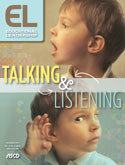On Facebook, my niece posts the questions her 4-year-old asked her during their 10-minute drive home from preschool:
L<EMPH TYPE="5">uke: How do you make a skyscraper? How does monkey grass grow? Why can't I see any monkey grass right now? What if we didn't have hands? How did God make us and our hands? Can I have a snack? Why are we still in the car? Why are we still in the car now? Why am I smaller than Allie? How come you don't know the name of the book we read at school about the giraffe? Why don't we have that book? Will you get it? Why do they call it a tea cup? Since we are home now, can I have a snack? Why don't we have the same snacks Preston has?
Luke's exuberance, his range of interests, his imaginative train of thought—I can't help but love this little guy. Plus, he's my great-nephew. The fact is that even before Luke has entered kindergarten, his inquiring mind is eager for the answers. Through questioning, talking, and (we hope) listening, he is trying to make sense of the world.
This issue of Educational Leadership is about encouraging more and better questioning, talking, and listening in the classroom. The Common Core State Standards advocate that these skills be taught throughout the grades, recognizing their importance for clear thinking. As our lead author Elizabeth City writes, "Talking matters for learning." There are other important reasons, too: "Dialogue matters for democracy and for making the world a better place," she writes. "Thinking, speaking, and listening are practices of freedom."
How can we make sure that we realize all the benefits of effective talking and listening? Here's what a few of our authors say.
Make talking and listening priorities. Author Erik Palmer notes that when he suggested at a conference that teachers teach speaking skills, one participant exclaimed, "That's what I don't have time for!" Yet, as he writes, "Everything you do in your class would improve if students spoke better. … The fact is, we do expect students to learn to speak—we just don't teach them how."
Search for the meaning. First and foremost, Doug Fisher and Nancy Frey write, students need to understand the purpose of any discussion they're asked to participate in. If they don't understand, students will talk about peripheral things. Interesting talk is not formulaic, one-sided, or random. It happens when students are interested in the ideas, follow the conversation attentively, aren't afraid to voice their own thoughts, probe misunderstandings, and look for evidence and reasons. For this to happen, teachers have to lay careful groundwork.
Make sure that everyone joins in. Casey Cuny asks an important question in his article about student discussions: "How many students arrive at school on Monday and leave on Friday without having said a word in any of their classes?" Yet, as Bryan Goodwin reports, research confirms that those who participate frequently are more likely to be high performers, and those who remain quiet tend to do less well. To restore the balance of interactions, our authors have many recommendations: frequently change the seating patterns, extend wait time (pp. 66, 82), ask fewer but more thoughtful questions (pp. 36, 54), and teach talking routines—from seminars to homework review sessions (pp. 42, 60).
Vary your own patterns. Talk less but talk strategically, our authors urge (pp. 48, 66, 78). Listen intently to learn what is going on in kids' minds. Respond to children with helpful questions—like, Why do you think that? Can you give me an example? Where could we find that information you just brought up? Can you tell us more?—to get them both talking and listening more carefully (p. 18).
Will Luke get all his questions answered—or will he drive his parents and future teachers crazy? A lot will depend on how talking and listening become part of his life—at home and at school. My wish for Luke is that throughout his life he remain interesting and interested. Meanwhile, let's get him that book on giraffes and find out why he wants to know about monkey grass.
<P ID="scherer-audio"><!-- Start of Brightcove Player --><!--div style="display:none"></div--><!--By use of this code snippet, I agree to the Brightcove Publisher T and C found at https://accounts.brightcove.com/en/terms-and-conditions/. --> <!--<object id="myExperience3828127123001" class="BrightcoveExperience"> <param name="bgcolor" value="#FFFFFF" /><param name="width" value="570" /><param name="height" value="380" /><param name="playerID" value="18377529001" /> <param name="playerKey" value="AQ~~,AAAAAmGjiRE~,escbD3Me8-wT_coVb7sTe18vG6vv3Oyk" /> <param name="isVid" value="true" /><param name="dynamicStreaming" value="true" /><param name="@videoPlayer" value="3828127123001" /> </object>--><!-- This script tag will cause the Brightcove Players defined above it to be created as soonas the line is read by the browser. If you wish to have the player instantiated only afterthe rest of the HTML is processed and the page load is complete, remove the line.--><!-- End of Brightcove Player --><!-- use this code for HTML --> <!-- <object id="flashObj" width="486" height="412" classid="clsid:D27CDB6E-AE6D-11cf-96B8-444553540000" codebase="http://download.macromedia.com/pub/shockwave/cabs/flash/swflash.cab#version=9,0,47,0"><param name="movie" value="http://c.brightcove.com/services/viewer/federated_f9?isVid=1" /><param name="bgcolor" value="#FFFFFF" /><param name="flashVars" value="videoId=3828127123001&playerID=11490813001&playerKey=AQ~~,AAAAAmGjiRE~,escbD3Me8-zfW2J4SI2ZSHPsqtup23tT&domain=embed&dynamicStreaming=true" /><param name="base" value="http://admin.brightcove.com" /><param name="seamlesstabbing" value="false" /><param name="allowFullScreen" value="true" /><param name="swLiveConnect" value="true" /><param name="allowScriptAccess" value="always" /><embed src="http://c.brightcove.com/services/viewer/federated_f9?isVid=1" bgcolor="#FFFFFF" flashVars="videoId=3828127123001&playerID=11490813001&playerKey=AQ~~,AAAAAmGjiRE~,escbD3Me8-zfW2J4SI2ZSHPsqtup23tT&domain=embed&dynamicStreaming=true" base="http://admin.brightcove.com" name="flashObj" width="486" height="412" seamlesstabbing="false" type="application/x-shockwave-flash" allowFullScreen="true" swLiveConnect="true" allowScriptAccess="always" pluginspage="http://www.macromedia.com/shockwave/download/index.cgi?P1_Prod_Version=ShockwaveFlash"></embed></object>-->


